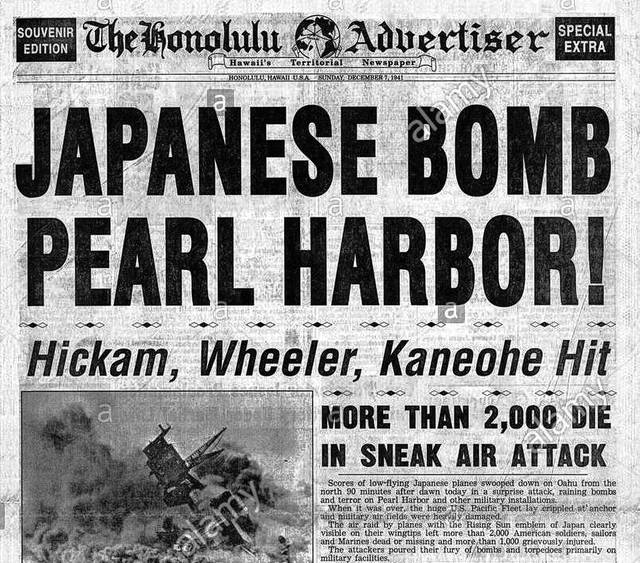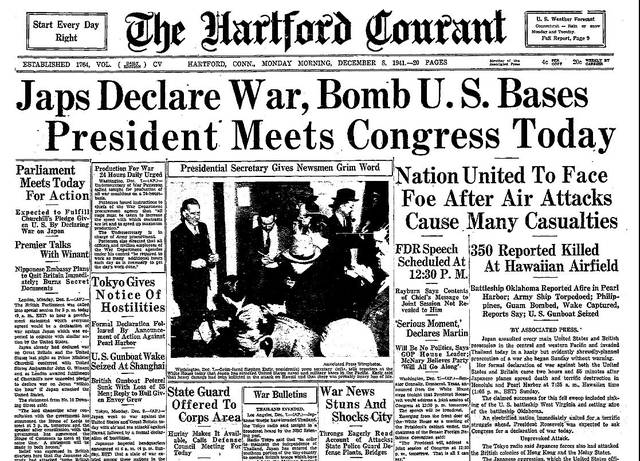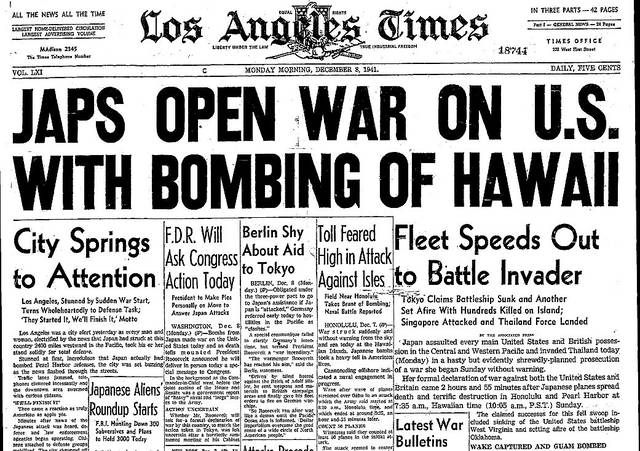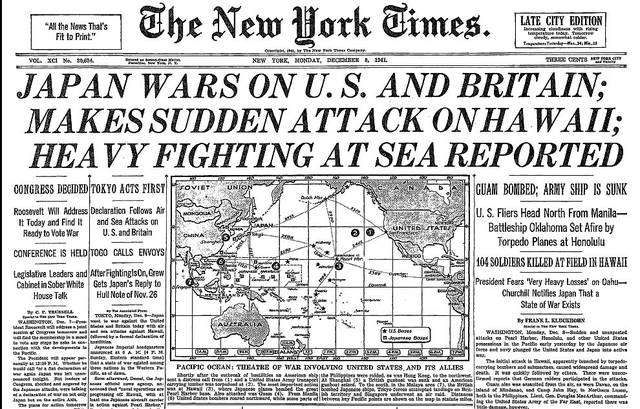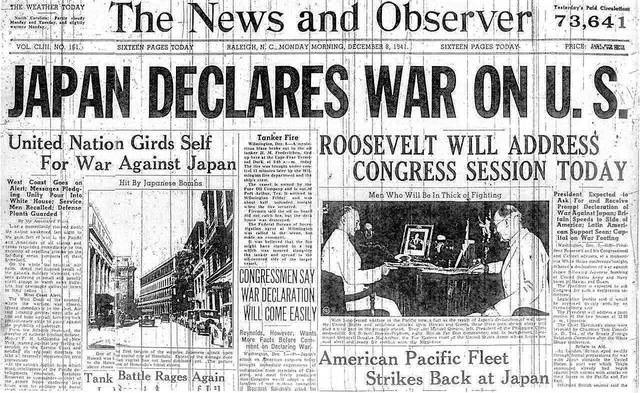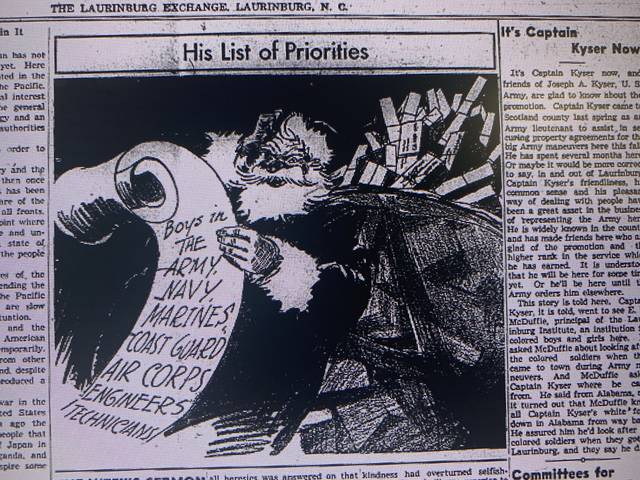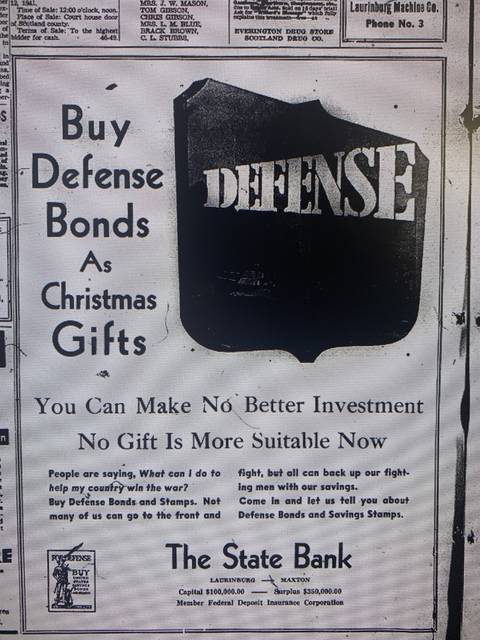LAURINBURG — It’s been 78 years since the Imperial Japanese Navy Air Service launched a surprise attack on Pearl Harbor in Hawaii, taking more than 1,100 lives during the two-hour attack.
Saturday marks the anniversary of the attack and several World War II veterans will be the grand marshals for the annual Laurinburg Christmas parade, which will begin at 3 p.m., and local residents say it is a day the United States should always remember.
“It’s a piece of history that we should always remember,” said Jimmy Bennett, commander for American Legion Post 50. “We lost a lot of lives over there and we shouldn’t let it go by the wayside.”
State Rep. Garland Pierce agreed with the statement, adding the day is one for remembering history.
“There are still families who are grieving the loss of loved ones from that dreadful day,” Pierce said. “It’s a somber time, but it’s a time of reflection of how our country was able to move forward and be successful after such a difficult day.”
Back in 1941, The Laurinburg Exchange was published once a week, on Thursdays, so the issue following the attacks on Pearl Harbor came four days later. But there wasn’t much in the issue about the attacks or any Scotland County residents who might have been in Pearl Harbor during the attack.
That changed for the next two issues of The Exchange — with both the Dec. 18 and 25 issues both speaking on the attack and the results of what going into the war meant for the county and the United States. Below are some of those stories directly copied from the original paper …
From Dec. 18, 1941:
Lieut. Beverly In War Service
Lieut. Ernest Beverly, flying ace for Uncle Sam’s Army and leader of a squadron of fighter, may be in the battle lines in the Pacific. Until recently Lieut. Beverly was located in Porto Rico, but no news has come from him of late and efforts of his people here to located him early in the week were unsuccessful. He has been in the Army aviation service for a number of years and is regarded as one of the best and most capable men in the service.
Word Comes From Cecil Sanford, Jr.
A cablegram from Cecil Sanford Jr., ensign in the U.S. Navy and attached to the staff of the U.S. S. Reid was received Wednesday by his parents Mr. and Mrs. C. L. Sanford. Ensign Sanford was recently at Pearl Harbor and his parents were uneasy about him but the message said he was safe and well. It came from Honolulu. *This was printed on the front page of the issue but in a article in a later page it stated that there had been no word from him. The second story is below.*
Scotland County Boys in War Zone
Scotland county boys are in the war zone in the Pacific, or they are on their way. Cecil Sanford Jr., son of Mr. and Mrs. C. L. Sanford, when last heard from was at Pearl Harbor. That was before the great naval disaster and the treacherous attack by the Japanese on Sunday, Dec. 7. He wrote his parents that he might not be at Pearl Harbor for Long and the absence of further word or news from him leads them to believe that his ship either left Pearl Harbor or he was not injured.
Mr. Sanford, honor graduate of the University of North Carolina and an instructor in English at a well known school in New England last year, gave up his work to volunteer in the Navy and took special training for a commission.
Lieut. John M. Gardner, son of Dr. and Mrs. J.M. Gardner of Gibson, is also on the Pacific coast and when last heard from was in San Francisco. Lieut. Gardner called his parents by telephone from San Francisco last week. His orders and his destination were military secrets.
We Are in the War
We Americans came into this war reluctantly. For two years we have indulged in more or less nebulous hope that somehow we might make a worthy contribution to the case of democracy without being drawn actively into the conflict. We know now that totalitarianism never meant for us to remain permanently out. Very well. We are in And with both feet. Until complete victory has been won for our side we do not mean to get out while a wheel is still turning in an American factory or an American airplane can keep the skies or an American keel can cut the waves or an American finger can pull the trigger.
From Dec. 25, 1941:
Note: This issue follows in volume number after the Dec. 11 issue but there was a misprint and the date is labeled Dec. 25, 1942. (Editor)
S.R. Snipes, Jr. Was At Pearl Harbor
S.R. Snipes, Jr., son of Mr. and Mrs. S. R Snipes of Laurinburg, was at Pearl Harbor when the Japs attacked that fortified stronghold on Sunday, December 7. A letter to his parents here which they received Monday of this week brings the information that he was safe and unhurt after the attack. Young Snipes attended Laurinburg high school and enlisted in the U.S. Marines two years ago.
A Letter from Hawaii Of Dec. 11
Mrs. O’Neal Wife of Sergeant Charlie O’Neal Writes Sister at Laurinburg About Experiences of December 7th.
The following letter written by Mrs. Charlie O’Neal of Hawaii, wife of Sergeant Charlie O’Neal of the U.S. Army forces in Hawaii to her sister Miss Mary Thomas of Laurinburg tells something of her experiences and sensations of Sunday, December 7, when the surprise attack by the Japanese forces at Pearl Harbor took place.
The letter says in part:
“We are both still living but I have never been so frightened in my life. Sunday morning (December 7) we heard airplanes and we thought it was just an alert. But it was the Japanese planes dropping machine gun shells right in my yard. They were trying to bomb a water supply which was about 50 feet away. They certainly caught the Navy with their pants down. The entire Island is so shocked. Then Sunday night I was in three air raids with nothing for protection except a roof I can see through.
“I stood against the wall with a quilt around me all Sunday night.
“Monday we were evacuated to Honolulu. Everything is in full swing now and they don’t think anymore will get through but that is what they thought before. If they had been on the job the Japs never would have gotten this place. (A line here that was censored and cannot be published.)
“We are sleeping with our clothes and shoes on. Don’t even have a bomb proof shelter but the Army is plowing down ditches for the families to get into in case of raids.
“All the soldiers were still asleep when they attacked Sunday morning. A bomb destroyed one barracks with 300 men still asleep.
“They are expecting the Germans to come in from that side so I don’t know whether they will try to send us back or not.
“The Navy is fighting out in the middle of the ocean now and no boards are leaving the coast. There is plenty of food here. Have issued us gas masks.
“Saboteurs have been caught and killed on sight. And believe me there are plenty of them here. Every night we have a blackout. And all we can do is sit by the radio and listen to warnings and announcements. Nobody can even realize what it is like who hasn’t been through it. Little did I ever think I would ever have to experience this.
“Well there is nothing that we can do. Don’t expect to hear from us often or maybe not at all because there are no boats and we don’t know when our air mail will go. Don’t worry about us. If we are expected to live we will come through and if no there is nothing that will save us. Remember, no news is good news. And if anything happens to us you will be notified.”
What To Do In The Event Of An Air Raid Here
The U.S. government released a lengthy list of things residents across the country should do in case planes are seen near the mainland. Under the title of “Government Doesn’t Want to Scare You, But Here’s Timely Advice and Warning Which People Should Heed and Study; Air Raids Not Impossible Here,” the list included such instructions as:
— Keep cool. Don’t lose your head. Do not crowd the streets; avoid chaos, prevent disorder and havoc.
— You can fool the enemy. It is easy. If planes come over stay where you are. Don’t phone unnecessarily. The chance you will be hit is small. It is part of the risk we must take to win this war. Until an alarm, go about your usual business and recreation in the ordinary way.
— Think twice before you do anything. Don’t believe rumors — spreading false rumors is part of the enemy’s technique. Don’t let him take you in.
— Stay home. The safest place in an air raid is at home. If you are away from home get under cover in the nearest shelter. Avoid crowded places. Stay off the streets. The enemy wants you to run out into the streets, create a mob, start a panic. Don’t do it!
— If the incendiary bombs fall, play a spray from a garden hose (never a splash or stream) of water on the bomb. Switch to a stream to put out any fire started by the bomb. Switch back to spray for the bomb. The bomb will burn for about 15 minutes if left alone, only about 2 minutes under a fine water spray. A jet splash, stream or bucket of water will make it explode.
— Under raid conditions keep a bathtub and buckets full of water for the use of the fire department in case water mains are broken Whether or not black-out is ordered don’t show more lights than is necessary. If planes come over put out or cover all lights at once don’t wait for the black-out order.
— Prepare one room, the one with the least window glass in the strongest part of your house for a refuge room. Put food and drinking water in it. Put a sturdy table in it. Put a mattress or two and a deck of cards into it. Take things like eyeglass and dentures with you when you go into it. Take toilet facilities, paper, a screen. If you have a portable radio take that too. Above all stay calm. Stay at home. Put out lights.
— If bombs start to fall near you lie down. You will feel the blast least that way, escape fragments or splinters. Most raids will likely be over in your immediate neighborhood in a short time. However, stay under cover till the “all clear” is sounded. Just keeping cool hurts the enemy more than anything else.
Katelin Gandee can be reached at 910-506-3171 or [email protected].
